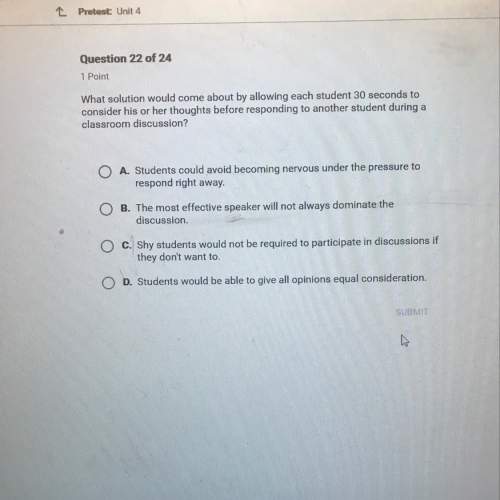
English, 17.12.2020 22:10 leahglover19
Which sentence best explains Lincoln's wartime decisions ackopted from Lincoln the Great by Wilfred W. McClay We should remember to that, with events controlling her, Lincoln had to do things as president that he was not equipped to do, either by experience or temperament. He had not only opposed the aggression of the Mexican War but was something of an antimilitarist' who abhorred violence. How then account for the fact that he became such a remarkably effective war leader, indeed the quintessential war president--the only president in our history whose entire term of office was defined by the conditions of war, and the emplayer and enabler of such legendarily destructive warriors as Grant and Sherman' It is surely one of the many mysteries about this man, He also excelled in understanding the larger political dimensions of the war, in riding the flow of events and changing Northern public opinion with a consummate sense of timing. He understood the importance of isolating and containing the South, keeping the border states out of the Confederacy and European mischief-makers out of the struggle. He gradually and deftly redefined the war as an unlimited, total struggle to overthrow the South's political system, and pushed his military leaders toward a strategy of unconditional surrender that was appropriate to the war's changing objectives. Such maneuvering helps us appreciate why Lincoln at first so actively suppressed the idea that the war was to be a war for emancipation, to the extent of countermanding John C. Fremont's Missouri Emancipation Proclamation in 1861. It helps us appreciate the mixture of genuine moral idealism and shrewd military calculation that lay behind Lincoln's decision to issue the Emancipation Proclamation, a document that is often untairly disparaged" on the grounds that it refrained from abolishing slavery and technically freed almost na one. Which brings us to the question of Lincoln's halfway measures, whose fuller context we need to remember. He rose to prominence as a politician who was antislavery but also anti-abolitionist. The strategy he preferred would have contained the spread of slavery, then gradually eliminated it-as opposed to overturning the institution in one grand liberatory gesture. Such a position perhaps seems incoherent now, and it failed in the end since the South conduded that it could not trust President Lincoln, who received not a single electoral vote from the South, to protect its "peculiar institution" But it was a pasitian predicated on Lincoln's belief that the mantenance of the Union was the zy to all other political goods

Answers: 1
Another question on English

English, 22.06.2019 05:50
What idea-generating technique allows members to intentionally develop unconventional or outlandish ideas? brainstorming
Answers: 1

English, 22.06.2019 11:00
Read this excerpt from we’ve got a job: the 1963 children’s march. though connor was commissioner of public safety, blacks knew that it wasn't their health and safety he intended to protect. and he certainly didn't put out their fires. between the late 1940s and early 1960s, more than fifty black homes and churches in birmingham were bombed. one neighborhood was hit so often, it was called "dynamite hill." no one was ever prosecuted, even when the police could identify the bombers. what is the tone of the excerpt? inquisitive sentimental apologetic scornful
Answers: 3

English, 22.06.2019 11:30
Which statement best describes the authors use of a claim and a counterclaim in the passage
Answers: 2

English, 22.06.2019 11:30
What role did the weather play in the progression of events in the great gatsby chapter 7? what might the weather symbolize?me
Answers: 1
You know the right answer?
Which sentence best explains Lincoln's wartime decisions ackopted from Lincoln the Great by Wilfred...
Questions

Social Studies, 30.06.2019 11:30


History, 30.06.2019 11:30

Physics, 30.06.2019 11:30

Mathematics, 30.06.2019 11:30




Social Studies, 30.06.2019 11:30






Computers and Technology, 30.06.2019 11:30


Physics, 30.06.2019 11:30


Social Studies, 30.06.2019 11:30




